For four Knights, lifeguarding a year-round calling
Students juggle school, pool responsibilities while reaping benefits of taking water rescue skills to the next level
Senior Reva Gill has been working year round for the City of Austin for four years. She started working as a lifeguard at neighborhood pools, but soon moved up the ranks and now works as a manager and at Barton Springs. Gill has had to cut back significantly on her hours over the school year so she has time to prioritize college applications, school work, and swim team.
September 21, 2022
Lifeguarding is often associated with the sound of bare feet hitting the wet pavement, the smell of sunscreen and the sight of families and young kids trying to cool down under the summer sun. For many students, however, lifeguarding isn’t just a temporary summertime hobby. It’s a year-round job that forces them to take on a whole new level of responsibility.
Students lifeguard everywhere, from their neighborhood pool to the Jewish Community Center to the YMCA.
Senior Helena Finos started lifeguarding for neighborhood pools two years ago, but now lifeguards in the big leagues—Barton Springs.
It’s just a whole new level of family and friendship there. It’s just such a gorgeous place to work. And it’s such a great community.
— senior Helena Finos
“There’s a lot more that you have to be aware of, considering the amount of people that come in,” Finos said. “The range of swimming abilities is a lot wider, and you just have to be a lot more aware when you’re a lifeguard at Barton than you would be at a public pool. There’s always something going on. We have saves almost every day.”
According to Finos, it’s not just the busy climate that makes Barton different from other pools.
“It’s just a whole new level of family and friendship there,” Finos said. “It’s just such a gorgeous place to work. And it’s such a great community.”
Senior Reva Gill also works at Barton Springs. She was hesitant to take the job, however, when another lifeguard warned her about the high expectations and intense environment there. Even in her first few days on the job, she was overwhelmed by the complex safety precautions and processes that she had to get used to.
“God, they really do chew you up and spit you out,” Gill said of her first shift. “It was just mayhem. It was a massive learning curve.”
When she had to aid a swimmer who had a seizure on her second day on the job, Gill knew she truly had her work cut out for her.
“It was really stressful. And it’s still stressful,” Gill said, “but after the first few days, I had a breakdown, and then a revelation.”
Like Finos, Gill had realized the community she had in her coworkers at Barton Springs. She’d stick with the job, despite its challenges, for the opportunity to connect with fellow rescuers.
Since this realization and acceptance of her new occupation, Gill has climbed the ranks through City of Austin to do more than just lifeguard. She also works as a pool manager, a water safety instructor and a lifeguard instructor.
Although many lifeguards are employed through the City Of Austin, community center pools such as the JCC and the YMCA hire separately.
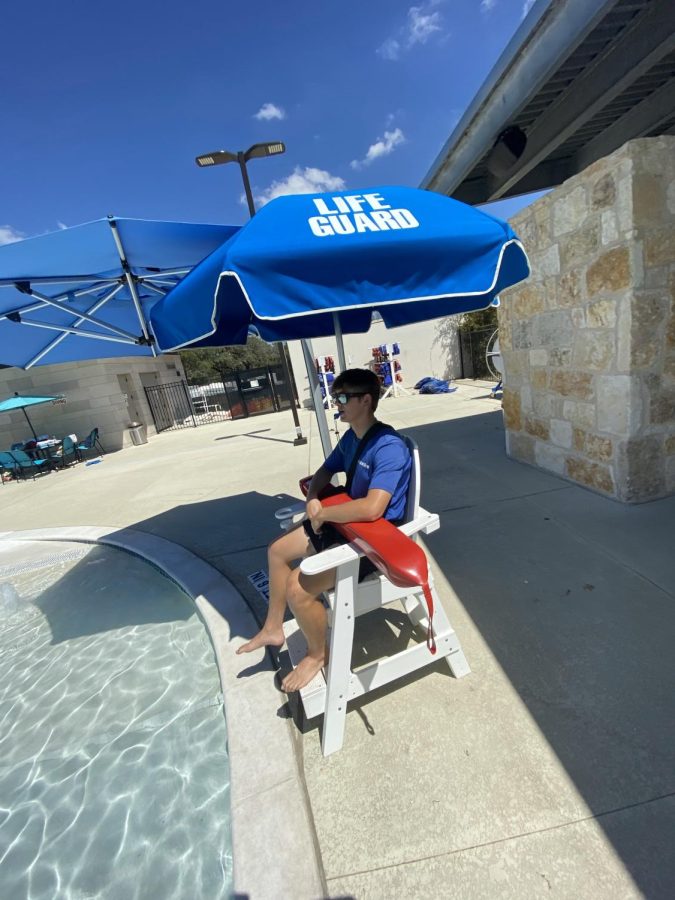
Junior Maggie Coulbourn started working at the YMCA last June. Her time there allowed her to use her second language to connect with the people she was lifeguarding.
“I had a lot of new experiences working at the Y,” Coulbourn said. “The Y serves a lot of different communities, and there were a lot of Spanish speaking patrons. I had conversations in Spanish, which was really cool for me because I’m actually using my Spanish to be genuinely helpful to someone.”
Junior John Dietz spent his summer lifeguarding at the Jewish Community Center. Over the summer, he had plenty of time to give to the visitors of the JCC, but now, his job has taken the back burner.
“The workload is pretty high this year,” Dietz said, “so I have to plan ahead for missing study opportunities. That’s the only downside of working during the school year and on weekends. There’s not a whole lot of time to just do whatever you want to do. You have to find time for yourself because you’ll just go insane if you’re only working and doing schoolwork the whole time.”
Dietz isn’t the only student struggling to balance schoolwork and lifeguarding. Gill had been working 20 hours per weekend, going to school, and captaining the swim team 5-10 hours a week before she realized it was starting to wear on her well-being.
There’s not a whole lot of time to just do whatever you want to do. You have to find time for yourself, because you’ll just go insane if you’re only working and doing schoolwork the whole time.
— junior John Dietz
“I’ve already gotten sick three times this year, and it’s just because I’m stretching myself too thin,” Gill said, “My mom realized this and was like, ‘You can’t be working this much.’ I’ve lessened my work over the weekend to 10 hours.”
Gill explained that at times, school feels like a break from her stressful work environment.
“At school I’m just worrying about myself,” Gill said. “When I’m at work, I’m sitting on a stand, monitoring 100 people, trying to determine which one I need to jump in for first. It’s just a different level of dependency and independent decision making and stress”
Finos, on the other hand, hasn’t struggled with balancing work and school, except for the occasional scheduling conflict. Instead, working as a lifeguard has simply affected the way she approaches school and her eventual career path.
“It’s what’s led me to want to pursue nursing,” Finos explained. “When treating people, they’ve always told me that they appreciate how calm I am in the situation. I once had to tend to a guy who went off the diving board and his kneecap slid out of place. He fell in and got a gash on his shin. Doing first aid like that made me appreciate healthcare.”
Whether lifeguarding is approached as a side job to make a little extra money or a prelude to a future career, one thing is for sure: Being responsible for the lives of others while being a teenager stressing about your own has been an outlook-changing experience for many students at McCallum. And frankly, the more students who have this experience, the better.




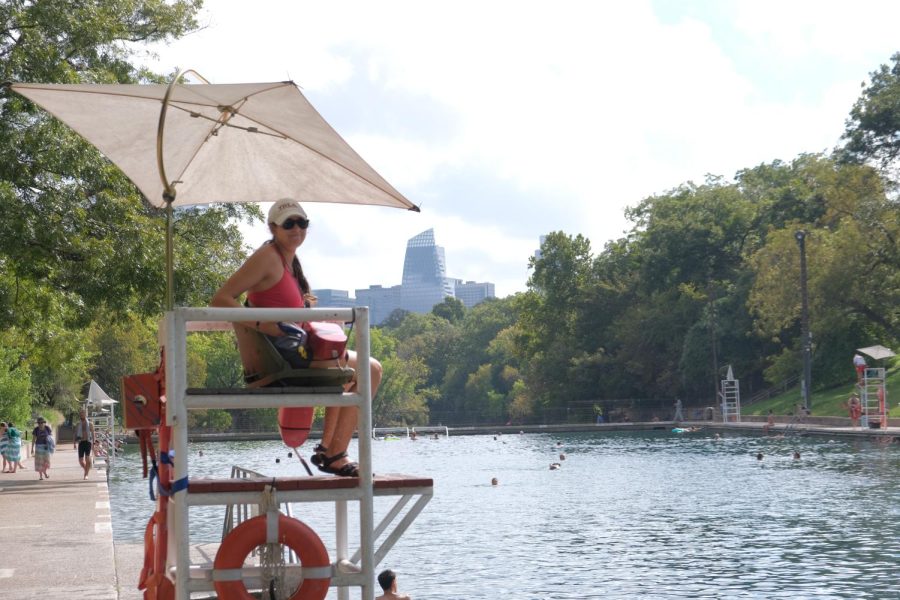
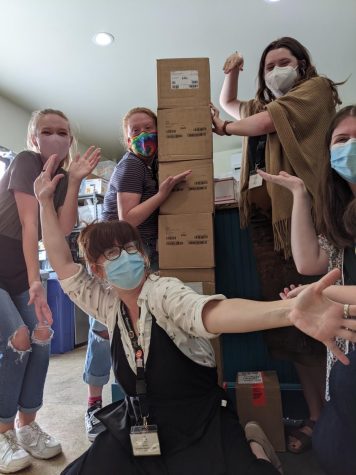
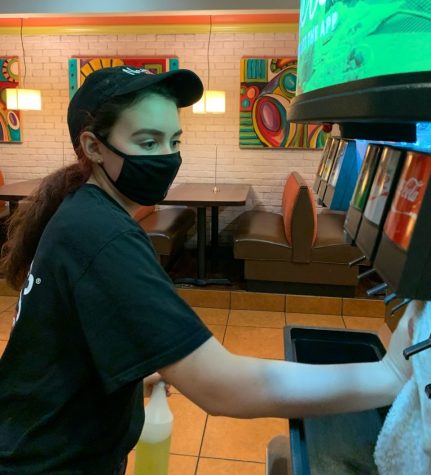
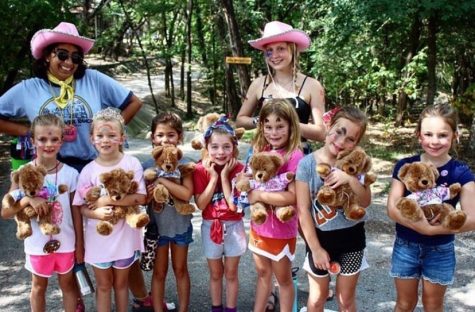
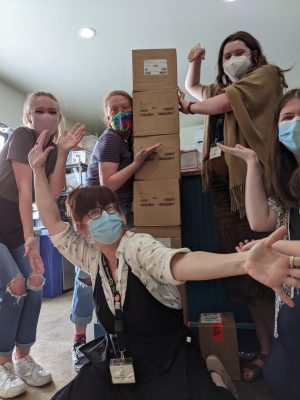
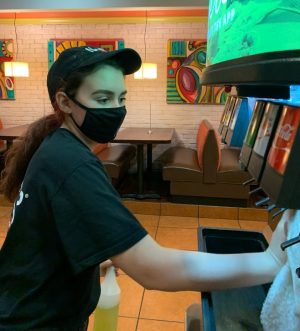


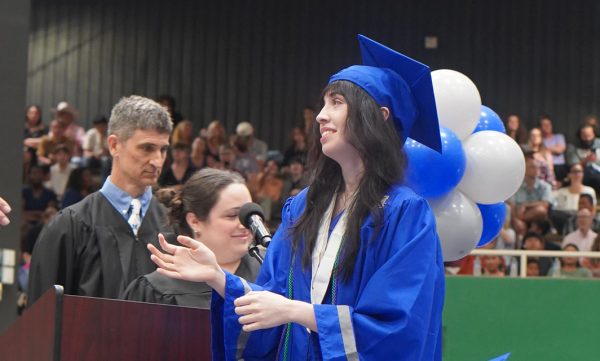

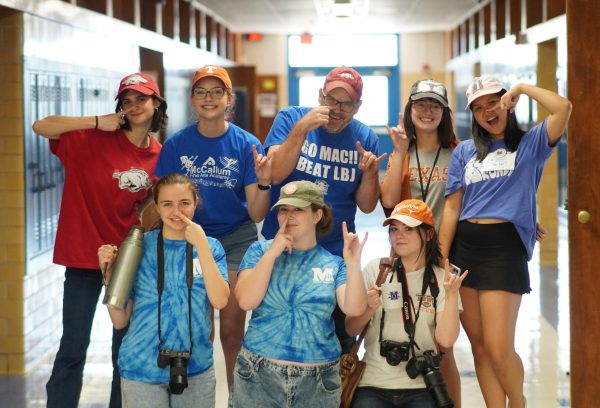

![This is Paul Pews high school graduation photo. The 2023-2024 school year marked his 34th year of teaching. He began his career in Washington, then came to McCallum where he has taught for the past 17. At heart though, he’s really a musician. One that grew up in many different places, including Chicago and California, who took interest in teaching from a young age. His high school choir experience, along with some international singing in college, persuaded him that teaching was his path. He knew he wanted to be able to help create works of art in the fine arts department as well, so he joined McCallum. He’s worked on many of the musicals over the years, even before Joshua Denning, the former theatre director of the fine arts program arrived. Before him was a different director: Tatum.
“I was the music director for all the musicals,” Pew said. “[Mr. Tatum and I] worked very hard, and I just got to the point where I was satisfied with it.” Although he may not be as prominent of a member in the musical theatre community at McCallum anymore, he still plays piano. “I still do a lot of music down at the Music end of the building,” Pew said. Photo courtesy of Paul Pew.](https://macshieldonline.com/wp-content/uploads/2024/07/Paul-Pew-1974-444x600.jpg)
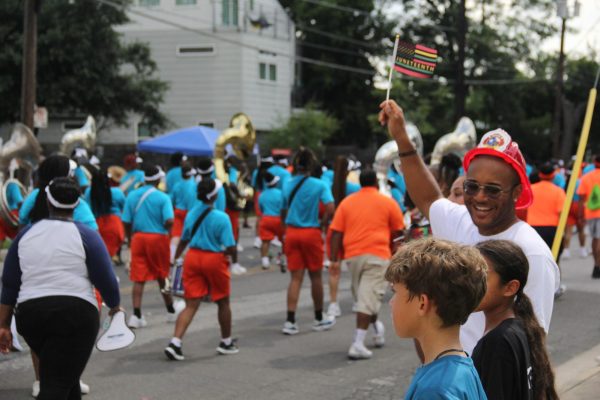
![DANCING QUEEN ONLY 15: The Mccallum quinceañera took place Saturday May 18 in the cafeteria. Students who danced at the quinceañera practiced for weeks during lunch and after school with the help of Señora A to perfect this special moment. “I signed up for fun and for the dress originally, but I actually made a lot of friends, and it helped me want to come back to practice,” said Elizabeth Peables, a freshman quinceñeara. “It’s been stressful, but it always works. We stayed very late yesterday [the day before the event], but today it feels like everything came together.”
Caption by Nellie Eschberger with reporting by Beatrix Lozach.
LA REINA DE BAILE, SOLAMENTE TIENE 15 AÑOS DE EDAD: La Quinceñera de McCallum fue el 18 de Mayo en la cafetería. Estudiantes que bailaron en la quinceañera practicaron por semanas durante el almuerzo y después de la escuela con la ayuda de la Sra. A para perfeccionar este momento especial.
“Originalmente me inscribí para divertirme, y por el vestido, pero actualmente hice muchos amigos y me ayudó a querer regresar a la práctica.” Dijo la estudiante de primer año Elizabeth Peables. “Ha sido muy estresante, pero siempre funciona.” “Nos quedamos muy tarde ayer el día antes del evento pero hoy se siente que todo está cayendo en forma.”
Leyenda por Nellie Eschberger con reportaje de Beatrix Lozach. Traducción por Maverick Palacios.](https://macshieldonline.com/wp-content/uploads/2024/06/53732328578_3ee2526f55_o_53769409497_o-600x338.jpg)
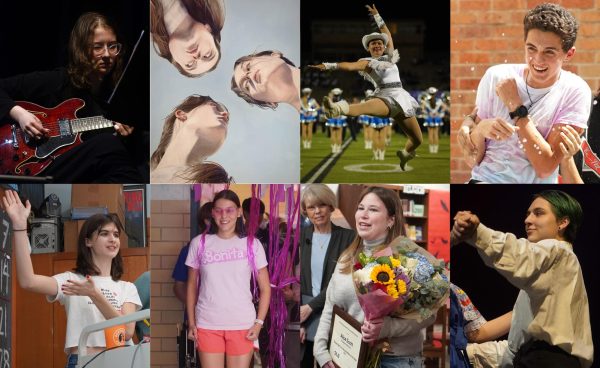
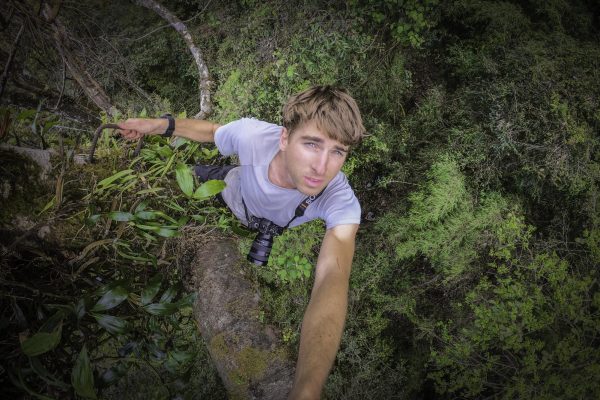
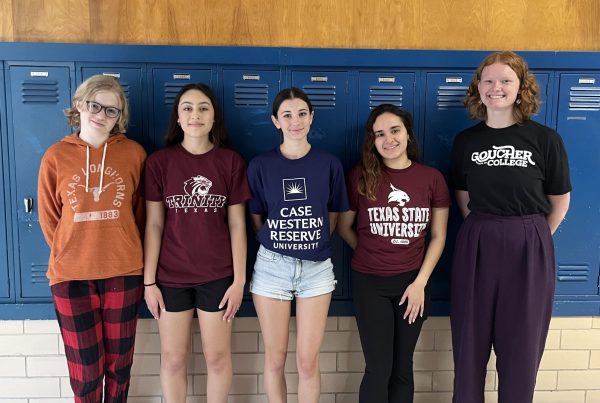

Shila Gill • Oct 26, 2022 at 11:03 pm
I really love this article, I think that it is very important to take a further dive into what McCallum students are doing outside of school. I think that this is also very important for the Austin community and I am incredibly impressed by all of their hard work and dedication even when school is going on, it must be incredibly hard to not only have to focus on school but also work many hours outside of school where they are saving lives.
Polly Francis • Sep 22, 2022 at 8:47 am
Very impressive and proud.